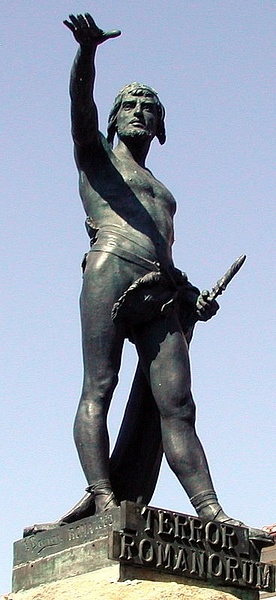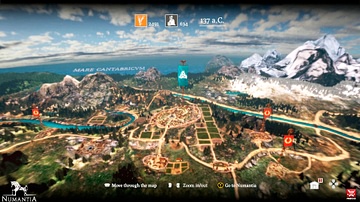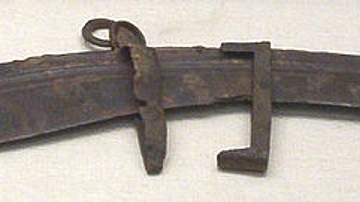
Viriathus (c. 180-140 BCE) was the leader of the Lusitani in their war with Rome. In 150 Viriathus escaped the Roman massacre and enslavement of Lusitani who had surrendered peacefully. Viriathus continued to fight in the resistance and rose to become the leader of the tribesmen. From 147 to 142 BCE, Viriathus won one victory after another against the Romans. However, Viriathus was unable to match Rome's vast resources and became worn down by attrition. In 140 BCE Viriathus renewed peace negotiations but was betrayed and murdered by close friends. One of Rome's most successful and charismatic foes, Viriathus became Portugal's first national hero.
Viriathus & the Lusitani surrender to Rome
The Lusitani were one of the large Celt-Iberian tribal groups of Hispania (Spain), the Roman name for the Iberian Peninsula. The Lusitani lands roughly equated with those of today's Portugal. In 206 BCE, after Rome had appropriated the Carthaginian domains of southern Spain, the native Iberians rose up in revolt. The ongoing conflicts eventually spread to involve the free Celt-Iberian tribes of central Spain. The Lusitani started fighting the Romans in 194 BCE, raiding into Hispania Ulterior, (further Spain) the nearest of the two Roman Spanish provinces. When in 179 BCE hostilities finally ceased, it was largely due to the respect the Lusitani had gained for the Roman governor Tiberius Sempronius Gracchus (the Elder). It was around this time that Viriathus was born.
Viriathus spent his childhood tending sheep in the hills and wild lands. When he became a teenager Viriathus likely started to join in local raids. Like other young Celt-Iberian warriors, he sought to prove his valor in the banditry that was common among the tribes. As Viriathus grew to manhood he watched his tribe's relations with Rome deteriorate. The governors that had come to take Gracchus' place were men of greed, who oppressed the neighboring tribes. After Lusitani complaints to the Roman Senate failed to improve the situation, the Lusitani resumed hostilities with Hispania Ulterior in 154 BCE. Viriathus would have been in his twenties at the time. In 153 BCE, some of the Lusitani even crossed the Pillars of Hercules (Gibraltar) and struck into Africa. Two years later, the Lusitani inflicted a defeat on Hispania Ulterior's Governor, Servius Sulpicius Galba. Probably Viriathus took part in at least some of these campaigns, his charisma and leadership gaining him a band of followers.
Although the Lusitani remained unbowed, the years of war had taken their toll. Almost certainly, Viriathus had lost relatives and close friends. Exhausted from having their homes burnt, their people killed or enslaved, the Lusitani sent envoys to Galba. He told them that he understood their reasons for making war. “Poorness of the soil and penury force you to do these things. But I will give my poor friends good land, and settle them in a fertile country, in three divisions” (Appian, Roman History, VI. X. 59, 60). Viriathus had heard of the great Gracchus from his elders. Perhaps Galba too was a man of his word.
Governor Galba betrays the Lusitani
Viriathus joined the men, women and children who gathered in the villages of Lusitania. They set out with their belongings, their carts, their livestock and their weapons, to meet up with others until scores became hundreds and hundreds became thousands. The year was 150 BCE and the Lusitani were surrendering to Rome. There were fully 30,000 of them when the Roman soldiers told the chieftains that the Lusitani should separate themselves into three groups. Escorted by legionaries and auxiliaries, the groups were led out of sight of each other.
Galba visited the first group, asking them to lay down their weapons to show their peaceful intentions. The Lusitani did as requested only to watch in apprehension as Roman soldiers dug a trench around them. The legionaries then forced their way through panicking Lusitani families. The Romans seized Lusitani of fighting age and killed them on the spot. A life of slavery awaited the others. Both the other tribal groups were dealt with in the same fashion. In what must have been a mad scramble to escape the slaughter, only a few escaped. Galba kept almost all of the loot and gave only a small amount to his soldiers. Back in Rome, the Senate was outraged at Galba's disdainful behavior but were unable to reprimand him on account of his great wealth.
Viriathus leads the Lusitani to Victory
Among the survivors of Galba's massacre was Viriathus, who swore vengeance on Rome. Viriathus became a young chieftain and in 147 BCE joined a Lusitani army raiding into Roman pacified Turdetania. Legate Gaius Vetilius responded vigorously, however, trapping the Lusitani against a river. Downcast, the Lusitani sent envoys with olive branches to Vetilius. They repeated their pleas for more fertile lands to settle on.
Vetilius agreed to the Lusitani demands but in turn demanded the surrender of their weapons. Viriathus would have none of it, reminding the tribesmen of Galba's treachery. His words stirred their hearts and spirits so that they called upon Viriathus to take command of their entire army. Assembling the Lusitani cavalry, Viriathus led them in feint charges against the Roman lines. The skirmishing confused the Roman commanders and allowed the Lusitani infantry to flee the field.
At night, Viriathus and the cavalry slipped away to join his infantry. Vetilius came in pursuit but the heavily armored legionaries were unable to catch up with the lightly armed Lusitani. Viriathus kept just out of reach, drawing the Romans up the Barbesula River valley until the Roman column was strung out along a narrow pass, with a slope covered in thickets on one side and a cliff on the other. Here Viriathus sprung his trap, wheeling his cavalry around and attacking from the front while tribesmen hidden in the thickets stormed down the slope. The Lusitani threw javelins then closed in wielding short swords and the deadly falcata, the curved sickle-like swords that widened toward the tip. The Romans managed to fight their way out but not before losing over half their number. Vetilius was among the 4000 casualties.
As Viriathus' renown grew, more and more tribesmen came over to his side. Here was a leader who even the Romans could not beat. Viriathus always divided the loot fairly, even distributing his own share to his bravest warriors. In a tale of his wedding, Viriathus was unimpressed by the gold and silver of his Romanized father-in-law. He leaned on his spear and ate little, offering sacrifices in the Lusitani way, then lifting his bride onto his horse and riding away into the hills.
In 146 BCE, Viriathus raided into the fertile Carpetani lands. Retreating before larger Roman forces, he wheeled back to strike at the strung out Roman column and inflicted severe casualties. The Romans named this feint and counter-strike method of fighting, the concursare. The same year Viriathus defeated another pursuing Roman army around Mt. Veneris (“Venus” mountain), harassed Roman garrisons in central Spain and captured Segobriga. Viriathus displayed the Roman standards throughout the hillsides. The Roman army commander, Claudius Unimanus left an account of the ferocity of the fighting:
In a narrow pass 300 Lusitani faced 1000 Romans; as a result of the action 70 of the former and 320 of the latter died. When the victorious Lusitani retired and dispersed confidently, one of them on foot became separated, and was surrounded by a detachment of pursuing cavalry. The lone warrior pierced the horse of one of the riders with his spear, and with a blow of his sword cut off the Roman's head, producing such terror among the others that they prudently retired under his arrogant and contemptuous gaze (Orosius, Seven Books of History Against the Pagans, 5.4).
Attrition wears down the Viriathus
Rome's victories in the Fourth Macedonian War (149-148 BCE) and the Third Punic War (149-146 BCE), freed additional resources up for the Spanish theater. In 145 BCE consul Fabius Maximus Aemilianus, of the renowned Scipio family, arrived in Hispania Ulterior with two green legions and allies totaling 15,000 foot and 2000 horse. Fabius took his time training his troops and limited them to skirmishes. In 144 BCE he engaged Viriathus directly, coming off the better and burning two cities to the ground. When Fabius was replaced by Quintus Pompeius the next year, Viriathus regained his winning streak, ambushing Quintus near Venus Mountain.
In 142 BCE, the fortunes of the war turned again when Fabius' brother, consul Fabius Maximus Servilianus brought with him 20,000 troops and routed Viriathus near Itucci. In their next confrontation, Viriathus slashed back in one of his typical counter-strikes and inflicted 3000 casualties. Nevertheless, worn down by attrition, Viriathus fell back from central Spain to Lusitania. After him came Servilianus, who laid siege to the town of Erisana. Viriathus came to the rescue, trapping the Romans in a defile but then offering peace terms.
Viriathus' only demand from Rome was that the Lusitani borders be respected and that the Lusitani become amici populi Romani -“Friends of the Roman People.” Although Servilianus accepted and the Senate ratified the terms, Roman pride found it hard to forgive a guerrilla leader who had humbled Rome. The Romans provoked the Lusitani until war erupted once more in 140 BCE. Servilianus' brother, consul Q. Servilius Caepio, who took over in Hispania Ulterior, chased Viriathus through Carpentania, Lusitania and through the Vettones lands. The passage of the Roman forces was marked by destruction. When Caepio was further reinforced by Popilius Laenas from Hispania Citerior, the Lusitani were ready to plead for peace. Laenas was ready to grant it, but only if Roman deserters and all weapons were handed over. The Romans punished the deserters in Hispanic fashion, by chopping their rights hands off. Reluctant to turn over his weapons, Viriathus chose three close friends, Audax, Ditalco and Minuros to further negotiate.
The Murder of Viriathus
Viriathus, who for years had outwitted his foes, failed to recognize the enemy among those closest to him. After returning from the Romans, his three “friends” came to Viriathus' tent at night. Telling the guard they urgently needed to confer with Viriathus, two of them held the sleeping Viriathus down while the third pushed a knife into his back. When the murder was discovered at daylight Viriathus' followers were overcome with sorrow and anger. The three conspirators slipped away to the Romans. Having been paid a sum in advance, they now wanted the remainder of their payment but were told that Rome did not pay traitors. Back at the Lusitani camp, Viriathus body was dressed in rich garments and then burnt on a funeral pyre. Sacrifices were offered and warriors ran and rode around the pyre.
Although a warrior named Tantalus tried to reverse Lusitani fortunes, without Viriathus large numbers of Lusitani surrendered to Laenas in 139 BCE. Fortunately, Laenas proved a man of his word, allotting farmlands to some and deporting others to new regions. Lusitania, nevertheless, remained free of Roman dominion until the reign of Emperor Augustus (27 BCE-14 CE), when the conquest of all of Hispania was completed.





